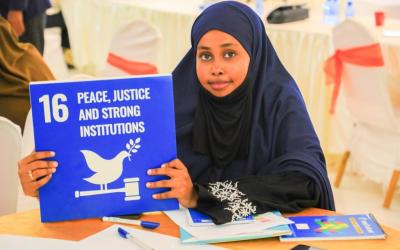Building Bridges for Sustainable Development: A Transformative Pathway to Health and Well-Being in Fragile States

The Building Capacity for Sustainable Development in Fragile States (SDGCap) project has been implemented during 2021-2023 with financial support from Sida to foster sustainable development in Africa through health and well-being, focusing on the Democratic Republic of Congo (DRC), Somalia, Uganda, and Sweden. The project successfully established a multisectoral collaboration between universities from these countries—Makerere University (Uganda), Karolinska Institutet (Sweden), Benadir University (Somalia), and the University of Kinshasa (DRC)—bridging north-south and south-south partnerships.
Impact of the project
In its 2,5-year span, the project achieved significant progress towards its goal of improving health, well-being, and reducing poverty and gender inequalities by building institutional capacity to meet the UN's 2030 Agenda. It executed about 70 activities across public, private, academic, and civil society sectors, focusing on strengthening collaborations across sectors that had previously lacked interaction.
The SDGCap project has influenced institutional change through targeted interventions:
- Uganda:
- District governments, previously disjointed, now collaborate across sectors, aligning their plans and budgets with the SDGs
- Capacity building has improved monitoring and evaluation of SDG progress, with districts integrating SDG targets and setting aside funds for annual voluntary local reviews
- Somalia:
- The project facilitated partnerships between academia, public, and private sectors, reducing silos and promoting public-private partnerships (PPP)
- Benadir University (BU) has collaborated with the Ministry of Planning and Statistics, contributing to national SDG reviews
- An Innovation Hub has been created at Benadir University
- A new PPP department was established at the Ministry of Health, driven by the project’s advocacy
- Democratic Republic of the Congo (DRC):
- The project raised SDG awareness among government stakeholders, leading to increased collaboration and data management efforts
- A national SDG dashboard was developed and a multisectoral platform was created during the National Forum on SDGs initiated by the SDGCap project
- The project empowered the OCDD to strengthen its role in monitoring progress and engaging new stakeholders
Academia as a Catalyst for Change
A key success of the SDGCap project was academia’s role as a neutral facilitator for multisectoral collaboration, building connections with national stakeholders like the Ministry of Planning in the DRC, Uganda’s SDG Secretariat, and Somalia's Ministry of Health.
Achievements were tailored to each country’s needs.
Impact:
- in the DRC, the project launched the first National SDG Forum and developed a digital SDG dashboard for transparency
- in Uganda, it strengthened district-level capacity and integrated academia as an actor into Local Voluntary Reviews
- in Somalia, it promoted innovation, student employability, and established a Public-Private Partnership department and Innovation Hub.
Overall, the project helped catalyze multisectoral collaboration, with academia serving as a mediator, contributing to national SDG reviews submitted to the UN, and laying a strong foundation for sustainable development in all three countries. Moving forward, a more focused scope, along with strengthened evaluation, is recommended for future phases to achieve even deeper and more tangible outcomes.
